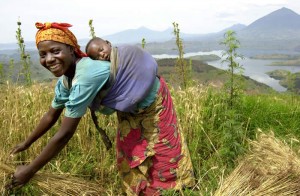Eric Munoz is an international policy analyst at Bread for the World Institute, a research and educational organization that educates opinion leaders, policymakers, and the public about hunger in the United States and abroad. Below, Eric sums up recent efforts by US policymakers to push for legislation to promote global food security and offers insights into the process.
Can you tell us about the new food security legislation that has been proposed?
In February 2009, Senators Richard Lugar (R-IN) and Robert Casey (D-PA) introduced S. 384, the Global Food Security Act of 2009. Companion legislation (H.R. 3077) has been introduced in the House of Representatives by Betty McCollum (D-MN). Both pieces of legislation call for the creation of a global food security strategy and a coordinator to oversee a “whole of government” effort to promote agriculture and rural development.
Both bills recognize the critical role of food security for infant and child nutrition. They also encourage efforts to link agriculture and rural development programs with health and nutrition initiatives and an emphasis on the role of women as caretakers and farmers. Importantly, the Senate and House versions both propose increased spending on rural development and emphasize partnerships to promote agriculture research. The Lugar/Casey and McCollum legislation also call for greater coordination among aid donors and participation of civil society in the creation of new strategies for improving food security.
In addition, Rep. Jim McGovern (D-MA) recently introduced H.R. 2817, the Roadmap to End Global Hunger and Promote Food Security Act of 2009. The legislation is based on recommendations endorsed by more than 40 relief and development organizations, including PATH. In addition to calling for the creation of a Global Food Security Coordinator and re-establishment of a Congressional Select Committee on Hunger, the Roadmap calls for an integrated response to global hunger that links emergency programs with investments to strengthen safety nets, nutrition programs, and agriculture and infrastructure development.
What does the proposed legislation mean for developing countries?
If there is one positive outcome from the sharp rise in food prices witnessed in 2008, it is the renewed attention to hunger and food insecurity. These new pieces of legislation would authorize more money to address critical agriculture and rural development needs. Just as importantly, once signed into law, they would promote greater cooperation among the various department and agencies currently supporting humanitarian and development activities. Creating a coordinated response to global food security is sorely needed to ensure a comprehensive and consistent approach to a critical development challenge. Passage of new food security legislation would renew attention and focus on agriculture and nutrition and is a critical first step in ensuring that US development assistance makes poverty alleviation and human development a priority.
What kind of support do these bills have?
In the Senate, the Global Food Security Act currently has 11 cosponsors and is farthest along in the legislative process, having been marked up and favorably reported out of the Committee on Foreign Relations. Rep. McCollum’s bill has 10 cosponsors at this time. Both versions of the Global Food Security Act are generally well supported by international development nongovernmental organizations (NGOs) and other agricultural development actors. Rep. McGovern’s bill, H.R. 2817, has 16 cosponsors and also enjoys broad support by the NGO community.
It is vital that each of the three bills garner increased bipartisan support. Members of Congress who support the bills and advocates need to do further education and outreach to make that a reality.
What do you expect to be next steps?
Legislation to expand support for agriculture and food security is part of a broader effort to modernize US foreign assistance. Rep. Howard Berman (D-CA), Chairman of the House Foreign Affairs Committee and Sen. John Kerry (D-MA), Chairman of the Senate Foreign Relations Committee are both committed to overhauling and streamlining US foreign assistance programs. As they concentrate on this important effort, work on sector-specific bills is being postponed.
Senators Lugar and Casey will likely continue to work with Senate leadership and their colleagues to garner more support for the bill in order to bring it to the Senate floor for a vote, either on its own or attached to another bill that is already moving and is scheduled for a vote.
Sponsors of each of the House bills are reaching out to other House members to increase bipartisan support. No date has been set for committee hearings for either bill.
So how can we learn more?
Introduction of these bills presents an important opportunity for the development community to show support for nutrition, agriculture, and food security. Several members of the NGO community and InterAction, the umbrella organization of development NGOs, have been leading advocacy efforts in support of these bills. If you would like to learn more, contact Bread for the World, PATH, or InterAction.
Visit the Bread for the World website.
Read IYCN’s commentary on nutrition and food security.
Photos: Aurelio Ayala III, Philippe Blanc, WFP/Riccardo Gangale
Date: Mar 9, 2009 | Category: Q&As

